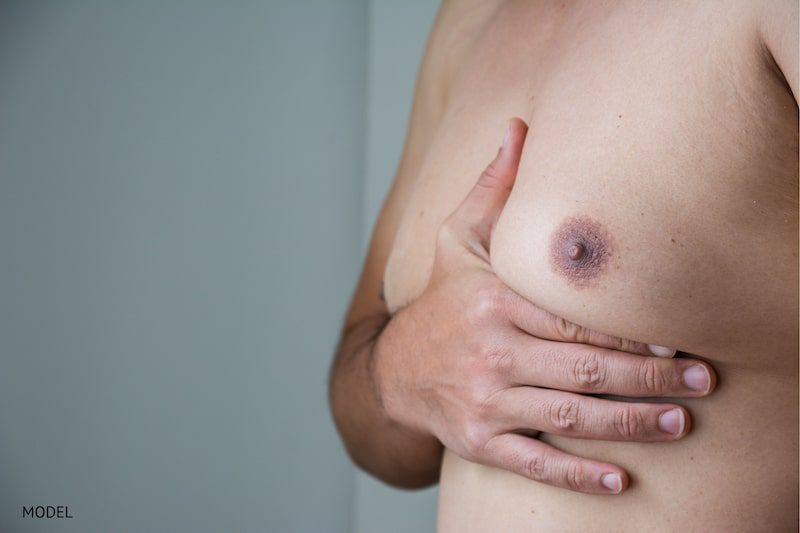April 05, 2021 | Gynecomastia, Male Cosmetic Surgery
3 Minute Read:
Gynecomastia is a condition where the breast tissue and breast fat in boys or men become overdeveloped and/or asymmetrical. This condition most commonly affects teenage or pre-teen boys experiencing hormonal changes due to the onset of puberty. However, this unwanted condition can affect men at any age at any stage of their life.

While gynecomastia is painless and physically harmless, it can wreak havoc on men’s self-esteem and confidence levels both in and out of a shirt. Commonly referred to as “man boobs,” this excess growth is something that all men want to be gone.
Unfortunately, it is impossible to eliminate excess glandular tissue with diet and exercise, and it is difficult to spot-reduce the breasts if fat is the cause of gynecomastia.
What Causes Gynecomastia?
Gynecomastia is usually a benign (non-cancerous) condition often related to hormonal imbalances in the body. However, in some cases, the development of male breasts is unknown.
Medications, such as antidepressants, antibiotics, excessive testosterone replacement, illegal drugs (like steroids), cardiovascular medications, chemotherapy, and other drugs, can increase the chance of developing gynecomastia.
Additionally, certain diseases and medical conditions can cause gynecomastia. If a patient suffers from liver or kidney disease, certain cancers, tumors, congenital conditions, obesity, injury, or trauma, they may be at greater risk for developing gynecomastia.
Do I Need Gynecomastia Surgery, or Will Natural Approaches Work for Me?
Just like gynecomastia has several causes, it also has variations that can influence the treatment needed. Sometimes in pre-teens and teens, gynecomastia is caused by a temporary hormonal imbalance brought on by puberty. Often, this type of gynecomastia rectifies itself and does not require gynecomastia surgery (male breast reduction).
Other times, men develop gynecomastia at the same time as they gain weight elsewhere on their bodies. Men whose gynecomastia is linked to weight gain may see a reduction in their breasts should they lose weight. Alternatively, liposuction alone can remedy this excess.
Unfortunately, men with significant gynecomastia that does not fall into one of the above categories may need to consider gynecomastia surgery.
The ideal candidate for gynecomastia surgery will be in good health, a non-smoker, and a non-drug user. A candidate for this surgery must also be of a healthy weight and have realistic expectations as to what the surgery will accomplish.
Surgery is the best option when alternative medical treatment is unsuccessful.
What Should I Expect During Gynecomastia Surgery?
Anesthesia is administered for the patient’s comfort. Dr. Agullo will decide if you should receive intravenous anesthesia or general anesthesia. If fatty tissue is the cause of gynecomastia, then liposuction will remove the excess fat. Several small incisions will be made, and a cannula will be inserted and used to loosen excess fat, which is removed with suction.
Excision techniques may be used if glandular breast tissue or excess skin must be removed to correct the condition. Excision must be used if the areola will be reduced or the nipple must be moved to a more natural male contour.
In some cases, both liposuction and excision are used.
What Is Recovery Like After Gynecomastia Surgery? Will My Gynecomastia Return?
Recovery times for this type of surgery can vary. Dressings or bandages will be applied to the excisions. You will be required to wear a compression garment to reduce swelling and encourage healing. A small, thin tube may be inserted to drain excess fluid or blood that may collect. You will be given specific instructions on how to care for the surgical site. Medication will be prescribed to help with pain and prevent infection.
For most men, male breast reduction provides permanent results, and your gynecomastia should not return. However, weight gain, steroid abuse, or gynecomastia-causing medication use may impact your results.
Interested in Learning More?
If you are ready to discuss your options, give us a call today at (915) 590-7900 or fill out our contact form online. We are here to answer your questions and address your concerns.



